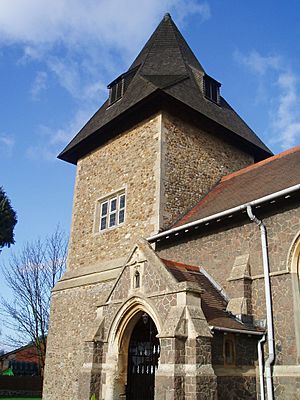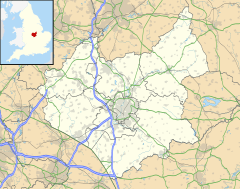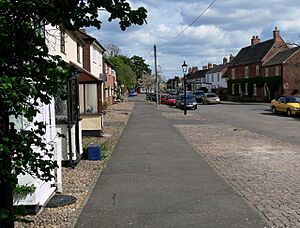Newbold Verdon facts for kids
Quick facts for kids Newbold Verdon |
|
|---|---|
 St James's Church, Newbold Verdon |
|
| Population | 3,012 (2011 Census) |
| District |
|
| Shire county | |
| Region | |
| Country | England |
| Sovereign state | United Kingdom |
| Post town | LEICESTER |
| Postcode district | LE9 |
| Police | Leicestershire |
| Fire | Leicestershire |
| Ambulance | East Midlands |
| EU Parliament | East Midlands |
| UK Parliament |
|
Newbold Verdon is a friendly village in Leicestershire, England. It's a place where people live and work, and it includes areas like Newbold Heath and Brascote.
Long ago, Newbold Verdon was mainly a farming village. But in the 1850s, it grew bigger because of coal mining nearby. Today, the mines are closed. Newbold Verdon is now a "commuter village." This means many people who live there travel to bigger towns like Leicester (about 9.5 miles east) and Hinckley (about 8.5 miles south) for work.
In 2011, about 3,012 people lived in Newbold Verdon. The village is located on the B582 road, between the villages of Barlestone and Desford. It's also about 4 miles (6.4 km) east of the small town of Market Bosworth.
Contents
What's in a Name?
The name Newbold Verdon has a cool history! In a very old book from 1086 called the Domesday Book, the village was called Niwebold. This name meant 'New Build' or 'newly built place'.
Later, in 1226, a man named Nicholas de Verdon owned the land. So, the village added 'Verdon' to its name. This helped people know it was his land. Even today, the local church area is still called Newbold de Verdun.
A Look Back in Time
In 1280, Newbold, Brascote, Naneby, and Barlestone were seen as one big village. They had a lot of trees, about 80 acres of woodland. They even had a vineyard, where grapes were grown!
In 1428, there was a worry about a sickness called cholera in the village. So, Newbold was put under "quarantine." This meant people couldn't easily go in or out. Luckily, the sickness wasn't serious, and the quarantine ended quickly.
In 1509, some land in Newbold was "enclosed." This means fences or hedges were put up to mark private fields. The biggest enclosure happened in 1810. At that time, the church was given a large area of land, about 1,316 acres.
Some old homes still stand today. Cob Cottage is thought to be the oldest house, built way back in 1650!
A special event happened on March 22, 2015. The funeral procession for King Richard III passed through Newbold Verdon. It was on its way to Leicester Cathedral, where he was laid to rest.
Village Work and Life
Long ago, many people in Newbold Verdon worked as "framework knitters." They used special machines to make knitted fabric. By 1845, there were over 60 of these knitting machines in the village.
But then, coal mines opened in nearby villages. Many knitters left their machines and went to work in the mines instead.
Newbold Verdon used to be a village that could mostly take care of itself. It had its own tailors, blacksmiths, and people who made and fixed wheels. There were also butchers and shoemakers.
It was easy for bakers to get flour because three windmills worked in the village! One was in Mill Lane. Another was moved from a place called Syston in 1812 and set up near where the Windmill Inn is today. A third mill was on Desford Road.
Learning in Newbold Verdon
The local primary school is on Dragon Lane. Each age group has its own class. The school also has a special unit for children with Autism. It has a calming sensory garden, a pond, and a "forest school" where kids can learn outdoors.
Places of Worship
Newbold Verdon has several churches:
- St. James's Church, built in 1209.
- A Methodist chapel, built in 1894.
- A Baptist church, built in 1833.
The Baptist Church has groups like the "Bright Hour" and the "Grandtots Group" for different ages.
Village Pubs
There are two public houses, often called pubs, in the village:
- The Jubilee
- The Windmill (which is actually in Brascote)
There is also a working men's club, but it is currently closed.
Sports and Fun
Newbold Verdon once had a short-lived greyhound racing track. Races started there on April 15, 1930. It was an "independent" track, meaning it wasn't part of the main racing group. These were sometimes called "flapping tracks." We don't know the exact spot where the track was located today.
 |
Barlestone | Newbold Heath | Merry Lees |  |
| Market Bosworth | Desford | |||
| Cadeby | Brascote | Peckleton |
See also
 In Spanish: Newbold Verdon para niños
In Spanish: Newbold Verdon para niños
 | Dorothy Vaughan |
 | Charles Henry Turner |
 | Hildrus Poindexter |
 | Henry Cecil McBay |



